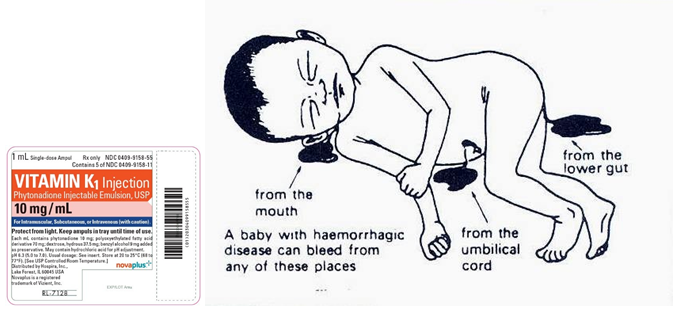The father of a newborn asks the practical nurse (PN) why an injection is being given to his baby. Which response by the PN best explains the purpose of administering Phyto menadione injectable to newborns?
Promotes maturation of the lungs.
Aids in digestion and milk absorption.
Prevents hemorrhagic disease.
Controls hyperbilirubinemia.
The Correct Answer is C
Phyto menadione injectable, also known as vitamin K1, is commonly given to newborns to prevent hemorrhagic disease of the newborn (HDN), a bleeding disorder that can occur due to vitamin K deficiency in the first few days of life. Vitamin K is important for the production of clotting factors in the liver, and newborns are at risk of vitamin K deficiency because it does not cross the placenta well and their intestinal flora is not yet established. The other options do not accurately describe the purpose of administering Phyto menadione injectable to newborns.

Nursing Test Bank
Naxlex Comprehensive Predictor Exams
Related Questions
Correct Answer is A
Explanation
One of the most important interventions in caring for clients with major depressive disorder is building a therapeutic relationship. Scheduling regular periods of time for interaction with the client demonstrates support and provides an opportunity for the client to express their feelings and concerns. Journaling and self-reflection can be helpful interventions for some clients, but they do not necessarily demonstrate support.
Assisting the client to identify symptoms of depression is important for assessment and care planning, but it is not a way to demonstrate support.
Incorporating animated communication techniques may be appropriate for certain clients, but it is not a universal intervention for supporting clients with major depressive disorder.

Correct Answer is C
Explanation
The first action the PN should take is to obtain a point-of-care glucose test. This will provide immediate information about the patient's blood sugar level and help guide further interventions.
Option A, reviewing prior insulin prescriptions, is important but not the first priority.
Option B, checking blood pressure, is also important but not the most immediate concern.
Option D, assessing urine for ketones, can provide useful information about the presence of ketones in the urine, which can indicate diabetic ketoacidosis, but it is not the first action that should be taken.
Whether you are a student looking to ace your exams or a practicing nurse seeking to enhance your expertise , our nursing education contents will empower you with the confidence and competence to make a difference in the lives of patients and become a respected leader in the healthcare field.
Visit Naxlex, invest in your future and unlock endless possibilities with our unparalleled nursing education contents today
Report Wrong Answer on the Current Question
Do you disagree with the answer? If yes, what is your expected answer? Explain.
Kindly be descriptive with the issue you are facing.
